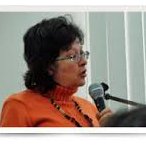English · Español

20 de enero de 2014 | Entrevistas | Bosques y biodiversidad | Soberanía Alimentaria | Mano a Mano
Argentina on the verge of authorizing new GMOs resistant to strong agrotoxics: interview with Elizabeth Bravo
Descargar: MP3 (1.4 MB)
Elizabeth Bravo (Ecuador) is the coordinator of the Network for a Latin America Free from GMOs (RALLT), member of the Alliance for Food Sovereignty of Latin America and the Caribbean and member of Accion Ecologica of Ecuador.
The activist was interviewed by Real World Radio about the situation in Latin America regarding GMOs and agrotoxics, and the urgent action to prevent the Argentinean government from authorizing soy and maize varieties –varieties than in addition to being genetically modified, are resistant to powerful poisons: 2,4D and glufosinate ammonium. 2, 4D was a major component of the war defoliant “agent orange” used in the Vietnam War, among others.
But in addition to its war legacy, this component represents a danger for ecosystems and human health in the Southern Cone and in those countries where these new GM organisms are grown and/or commercialized.
This information is included in a letter addressed to Argentinean President Cristina Fernandez as part of an urgent cyberaction that can be signed online here.
In fact, Argentina is on the verge of authorizing GM soy GM 444Ø6 - DAS – 6 developed by Dow AgroSciences Argentina SA that is tolerant to the herbicides 2,4 – D, to glyphosate and to ammonium glufosinate, after its approval by CONABIA (the National Advisory Commission on Agricultural Biotechnology) in December 2013.
Once this crop is approved, it is to be expected that GM maize resistant to both herbicides –which are considered even more toxic than glyphosate- will also be authorized. Although Bravo said that the campaign against these varieties is focused on Argentina, due to the imminence of their authorization, the campaign should be global, since there are similar authorizations taking place in the US and Canada. Its commercialization would also be released in South Africa, Australia and New Zealand, according to some reports, said Bravo.
“Evidently, contrary to what the industry is trying to convey, GMOs have become more and more dangerous for people and ecosystems”, she added.
In the interview with Real World Radio, Elizabeth broadened her analyses to Andean countries and called attention to the Colombian plains, tropical lands where GM cotton and maize are starting to be grown and where it is possible to grow glyphosate-resistant soy, since it was recently approved.
Bravo said that in November 2012, several environmentalist organizations, human rights groups, among others, sent a petition to the UN Special Rapporteur on the Right to Health to apply precautionary measures against the approval of these 2,4D resistant seeds, which was repeated in February 2013, without receiving any answer.
“We have to keep trying and this action should continue because the health of several million people depends on it”, said Bravo. And she added that in the International Year of Family Farming, GMOs and agrotoxics that are part of a highly land-concentrating model are being constantly approved.
Imagen: www.ups.edu.ec








